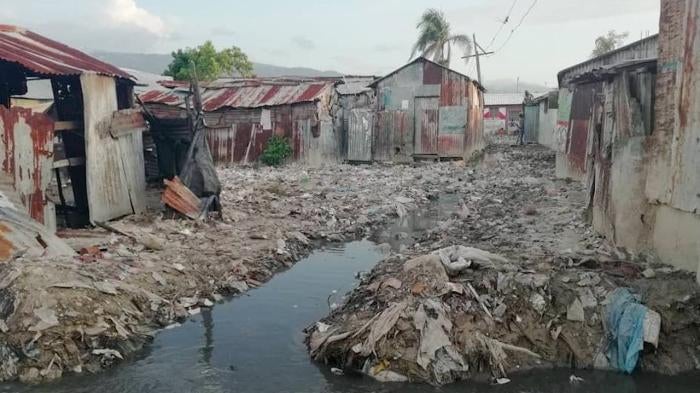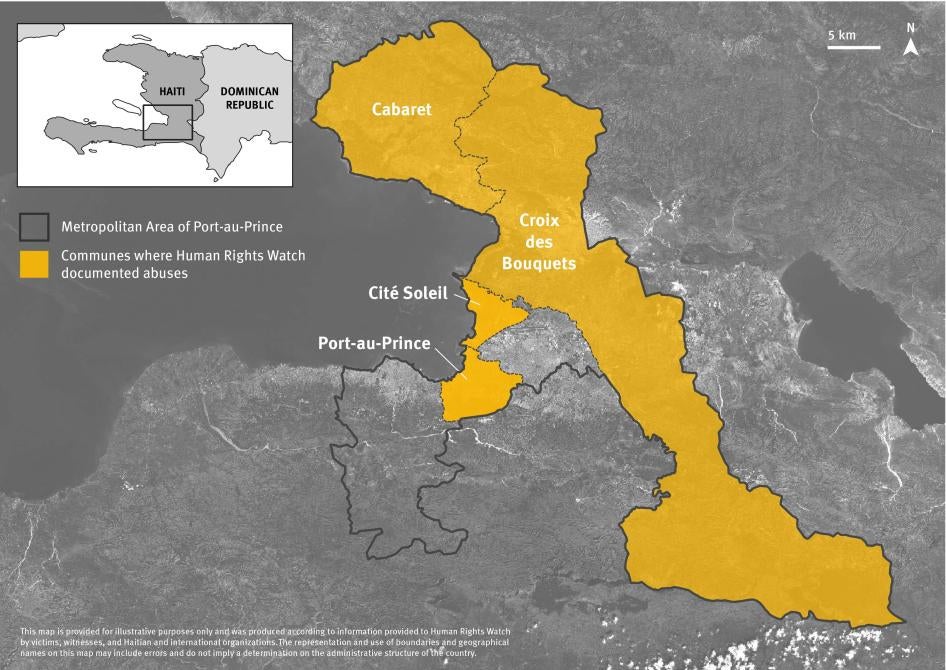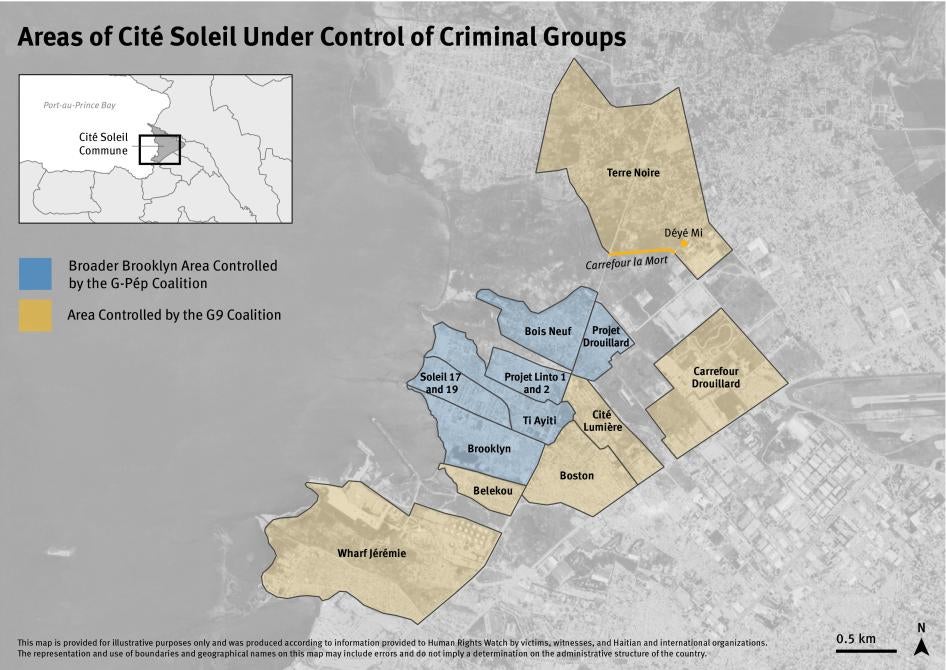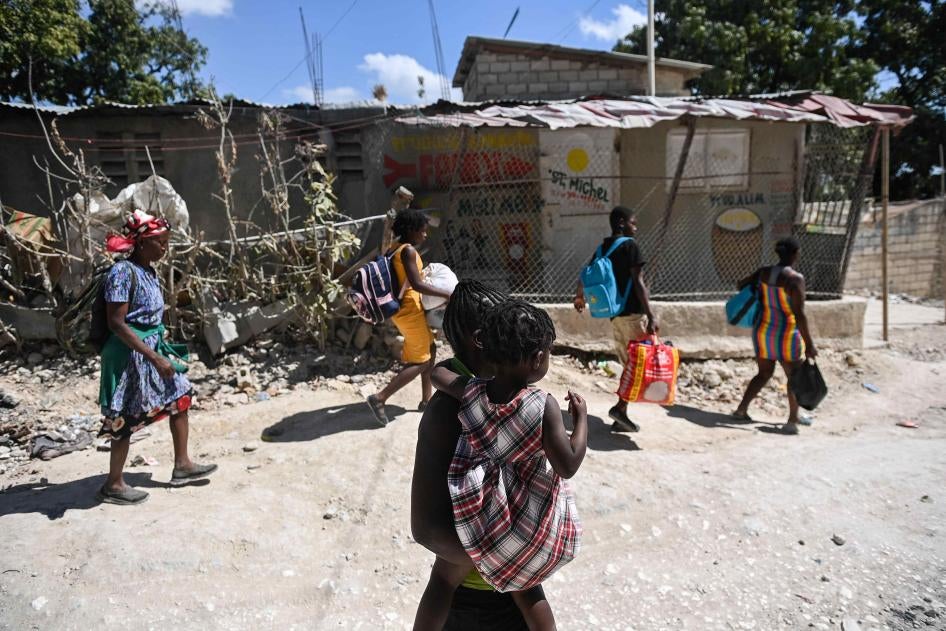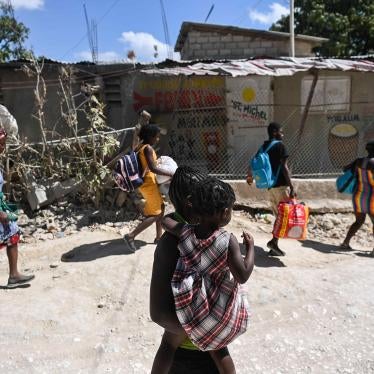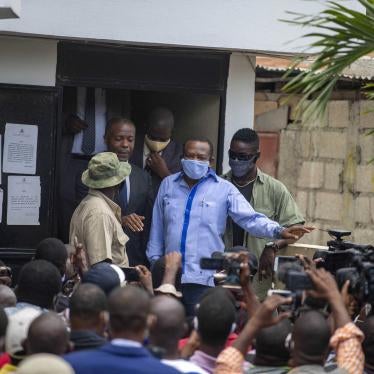- Killings, kidnappings, and sexual violence by criminal groups in and around Haiti’s capital, Port-au-Prince, have increased dramatically since the start of 2023.
- The Haitian government has failed to protect people from the violence of these criminal groups, many of which have alleged ties with senior political officials, economic actors, and police officers.
- International security support may be required, but it will most likely only be effective with a new transitional government and as part of a multi-faceted response with strong human rights safeguards.
(New York, August 14, 2023) – Killings, kidnappings, and sexual violence by criminal groups in and around Haiti’s capital, Port-au-Prince, have increased dramatically since the start of 2023 with a weak to non-existent state response, Human Rights Watch said in a report released today.
The 98-page report, “Living a Nightmare: Haiti Needs an Urgent Rights-Based Response to Escalating Crisis,” documents abuses committed by criminal groups and state inaction in four metropolitan Port-au-Prince communes – Cabaret, Cité Soleil, Croix-des-Bouquets, and Port-au-Prince itself – between January and April 2023. In Haiti, the state is nearly absent, impunity reigns, and nearly half the population is acutely food insecure. Human Rights Watch also assessed the humanitarian, political, and judicial crises, plus abuses of previous international interventions and the enduring legacy of slavery, exploitation, and abuse by colonial powers.
“Urgent action is needed to address the extreme levels of violence and the palpable fear, hunger, and sense of abandonment that so many Haitians experience today,” said Nathalye Cotrino, crisis and conflict researcher at Human Rights Watch. “International security support may be needed, but it will likely only help with a new transitional government in place and as part of a multi-faceted response with robust human rights safeguards.”
The United Nations, the US, France, Canada, members of the Caribbean Community, and other concerned governments should act urgently to support Haiti in overcoming its crisis and ensuring a democratic transition. The UN secretary-general is due to present options in the coming days to the UN Security Council for the deployment of a consensual international force to Haiti to help restore security, following a request from Haiti’s prime minister. Kenya has offered to take the lead and to provide 1,000 police officers for a multinational force.
Human Rights Watch interviewed over 100 people, before, during, and after a visit to Haiti in late April and early May, including 58 victims and witnesses of abuses interviewed in Haiti, as well as members of Haitian civil society, human rights and diaspora groups, representatives of the UN and humanitarian agencies, Haitian political actors, and government officials, including Prime Minister Ariel Henry. Human Rights Watch also reviewed data and reports from international and nongovernmental organizations, Haitian civil society groups, and media, and verified and geolocated videos and photographs of violent incidents.
The UN estimates that criminal groups in Haiti killed more than 2,000 people in the first half of 2023, kidnapped more than 1,000, and used sexual violence to terrorize the population. Human Rights Watch documented 67 killings, including of 11 children and 12 women, and more than 20 cases of rape, many of them gang rapes by multiple perpetrators. In response to the violence and state inaction, some Haitians have turned to “popular justice,” forming the Bwa Kale movement that gained traction in late April and, as of June, has killed more than 200 suspected criminal members across the country, often in collusion with police officers.
Approximately 150 criminal groups operate in the capital, Port-au-Prince, and its metropolitan region, many under two of the main criminal coalitions, the G-Pèp federation and the G9 alliance. Many of the worst abuses have taken place in Cité Soleil, a densely populated commune bordering the coast, where residents are caught in a protracted conflict between the G9 alliance led by Jimmy Chérizier, or “Barbecue,” and its rival, the G-Pèp federation led by Gabriel Jean-Pierre. G-Pèp controls an area called Brooklyn, while the G9 controls the surrounding neighborhoods and is trying to move into Brooklyn.
One woman Human Rights Watch interviewed said that she and her sister were walking home with a group of people on April 15 when they were stopped by G9 members, “They took several men from the group, made them line up, killed some of them with machetes and shot others,” she said. “The criminals cut open some of the men’s bodies before gathering them all together and setting them on fire. [Then] four men raped me.” The G9 members also raped her sister, and neither of the women were able to seek medical attention. The group killed the woman’s brother the same day.
The Haitian government has failed to protect people from the violence of these criminal groups, which has been exacerbated by the continued flow of weapons and ammunition to Haiti, largely from the US state of Florida. Many of the groups are alleged to have ties with senior political officials, economic actors, and police officers. Based on available information, there have been no prosecutions or convictions of those responsible for killings, kidnappings, and sexual violence, or their supporters, since the start of 2023.
The security crisis compounds an already dire humanitarian situation. “We don’t eat every day,” a Brooklyn resident said. “We only drink rainwater [and] my children are sick to their stomachs. We haven’t had electricity for a long time either.”
The UN estimates that nearly 60 percent of Haiti’s population of 11.5 million people lives below the poverty line. Almost 195,000 people have been internally displaced due to violence since 2022, and tens of thousands have attempted to flee the country. Despite repeated calls from the UN that Haitians should not be forcibly returned to Haiti, other countries have returned more than 73,800 people to Haiti in the first half of 2023.
Since the assassination of former President Jovenel Moïse in July 2021, Prime Minister Henry has controlled all executive and parliamentary functions and has not reached a consensus with Haitian political actors and civil society representatives to enable a democratic transition.
Nearly all Haitian civil society representatives and victims of abuse interviewed said that the situation had deteriorated so drastically that an international response is needed, including a security component. Many highlighted the need to avoid more harm and abuses now, with adequate safeguards to avoid the serious abuses that resulted from past international interventions. Haitian civil society representatives also said that other countries should stop supporting Prime Minister Henry, whom they see as heading an illegitimate and corrupt government with alleged links to criminal groups.
Efforts by an international security force to secure key locations and the country’s main roads should be accompanied by initiatives to provide jobs, education, and access to basic necessities in areas currently controlled by criminal groups, as well as to ensure that those responsible for serious abuses are investigated and prosecuted in credible, fair, rights-respecting procedures.
“The ongoing legacies of past abusive foreign interventions in Haiti should not be an excuse for inaction,” Cotrino said. “It should instead be a call to action to right past wrongs and to support Haitian efforts towards true democratic governance, respect for basic human rights, and an end to the deadly cycles of violence and abuse.”
